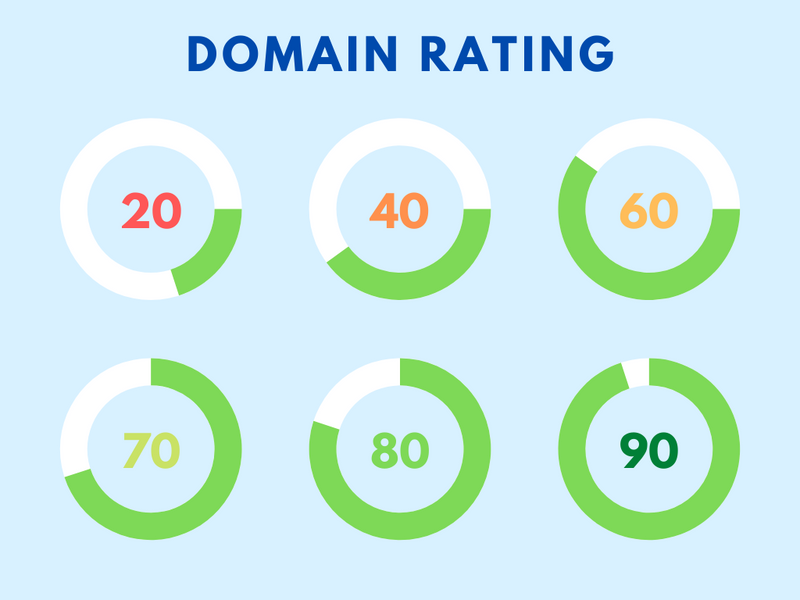Domain Authority and Domain Rating

Domain authority and domain rating are the terms you hear a lot when you have a website. Domain authority is an abstract notion that shows how trusted your website is.
Even though your website shapes the domain authority, it is attached to the domain. If you move your websites to another domain you'll lose the domain authority. If the new domain wasn't used before, you'd start from zero.
Before going into details, let's speak about two widely used metrics to measure domain authority.
Popular domain authority metrics
One of the metrics is Moz's Domain Authority. This metric is abbreviated as DA.
The next popular and nowadays the most popular metric is Ahrefs's Domain Rating (DR).
The main difference between Domain Rating and Domain Authority is that Domain Rating is a proprietary metric developed by Ahrefs, whereas Domain Authority is a proprietary metric developed by Moz.
Both metrics represent a way to measure how trustworthy and authoritative, and popular the domain is.
For example, if a domain is new, its authority and trustworthiness will naturally be close to zero.
If the website hosted on the domain gets a small number of links pointing to its pages, then the domain's authority will be low. Search engines would not put massive trust in a domain whose content is not linked by other websites.
On the other hand, Big names like Facebook, BBC, Wikipedia have massive amount of websites linking to them, and that is because of their high authority and rating, right?
For example, if an excellent article will be published on and on BBC and on a not popular website, The one published on the BBC would, of course, rank higher.
Note that Google does not use these metrics (DR & DA) to rank website pages. These metrics are just estimations that website owners can compare their websites to other websites.
As Ahref's Domain Rating (DR) is more popular in the SEO community, I will talk about it in the rest of the article.
Why should you be worried about DR?
If you are not sure to read further or not, I'll tell you when you have high enough DR then you'll have a lot of business opportunities.
Domain Rating (DR)
In short, domain rating is calculated based on the number of backlinks and from where these backlinks come. Since backlinks are one of the important aspects that Google uses to rank pages, Domain Rating is a very important metric for website owners.

You can read this detailed article on how the DR algorithm works. After reading the article you will not have a lot of questions about DR values and DR changes of your website.
To summarize the algorithm if you don't have time to read it. The Domain rating is calculated like this:
The DRs of the websites that link to all websites will be taken into the calculation. If a website links your website with more than one backlink only one backlink will be calculated.
- The more backlinks from different domains you will have the better.
- The higher the domain ratings (DRs) of the websites the better.
But there is one important thing to consider.
If a website links out to too many domains then the links from that website to your website would not be that strong.
For example, Forbes.com has high DR but it links to many domains. Forbes is very popular for guest posting in the business and marketing industry. Many professionals write articles on Forbes to get backlinks to their websites. For that reason, links from Forbes would not be that helpful and as another website that has almost the same DR but links to a few websites.
Based on these variables websites get ratings from 0 to 100. The world's top websites would have domain ratings close to 100. Many brand new websites would have a domain rating of 0.
The Domain Rating score (DR score) shown to users is a rounded number with the exception of the DRs from 0 to 5. The DRs from 0 to 5 have one decimal precision because the vast majority of the websites on the internet (over 80%) are within this range.
DR score is a dynamic score. Here are the main reasons it may change.
- You get backlinks from a domain/website that wasn't linking you before.
- You lose the last backlink from a domain/website.
- The DR of domains/websites that link to your website changes.
- Other websites improve their DRs and you don't. The new distribution of the DR from 0-100 gives you a lower DR score as a result.
Domain Rating is an important metric for link-building campaigns. However, when building links this is not the only metric that needs to be considered. URL rating (UR) is also a crucial metric when implementing a link-building campaign.
URL Rating (UR)
As Domain Rating (DR) is used for the domain to domain backlink profile comparison the URL rating (UR) is used for the page to page comparison.
Links from the High UR pages are preferred over the low UR pages. However, note that millions of new pages are created every month. For new pages, The UR would start from zero. It is natural that you will get links from the new pages.
Conclusion
UR rating and DR rating can help your pages to rank higher in the search engine result pages.
If your pages rank in the first place or at least on the first page of the result pages for some queries the chances will be high that you will get natural links.
Why?
Because many content writers link the first pages that appear on the search result when they search for the sources.
If you want to rank your blog posts higher it is also a wise idea to not use platforms that deliver slow pages because the load speed of your pages is also a vital metric used by search engines to rank pages.
For that reason, you can use the modern blogging platform.
